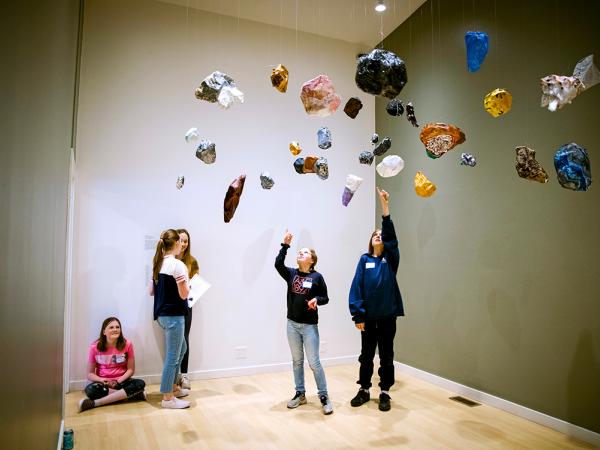Educator Resources
Art Rocks—Earth Science Sculptures

Students explore earth science, identifying rock types and their characteristics, including luster, formation, location, and density.
Sculptures of the rock are created using chicken wire, papier maché, paint, metallic paints, glitter glue, and tissue paper. To conclude the project students, will present their rock and introduce it to the class using a first-person monologue that explains the rock’s “story.”
Objectives:
- Students will choose a rock and identify its type, luster, and composition
- Students will create a 3D representation of their rock using materials provided
- Students will calculate the rock’s density
- Students will write and perform a monologue as a part of the project summary
Basic Lesson Outline:
- Introductory slide show
- Create sculptures
- Write monologues
- Present sculptures and monologues to the class
Art Supplies:
- Chicken wire
- Glue
- Water
- Tissue paper
- Acrylic paint
- Metallic paint
- Glitter glue
Other Resources:
Slide show to introduce project and related artwork (see outline at the end of the lesson plan)
Idaho State Learning Standards
Arts and Humanities: Anchor Standard 4: Convey meaning through the presentation/performance/production of an original work or unique interpretation of a work.
- Objective PR1.1: Combine knowledge and understanding from two or more disciplines to present/perform their original or interpreted works for an audience
- Objective PR1: Convey meaning through their presentation/performance
ESS2-MS Earth’s Systems
- ESS2-MS-1: Develop a model to describe the cycling of Earth’s materials and the flow of energy that drives this process. Further Explanation: Emphasis is on the processes of melting, crystallization, weathering, deformation, and sedimentation, which act together to form minerals and rocks through the cycling of Earth’s materials.
Academic Language:
- Subject area language: crystal, luster, hardness, streak, density, cleavage, fracture, ore, metal, nonmetal, gemstone, rock, igneous rock, sedimentary rock, sediment, metamorphic rock, rock cycle, extrusive rock, intrusive rock, clastic rock, conglomerate, organic rock, chemical sedimentary rock, metamorphism
- Art language: form, texture, color, space, pattern, sculpture, monologue, artist statement
Student Use of Vocabulary:
Students will use the words when creating their sculptures and in their final presentations
Student Grouping:
Students will work individually
Day 1 – Introduction
Introduce the project with a slide show
Questions to ask during the slide show include:
- What do you see?
- Why do you think the artists made particular the creative choices?
- How do you think the artist did that?
- How do you think math was used in this art?
- How are the artists similar? How are they different?
Review the art terms:
- Form
- Texture
- Color
- Space
- Sculpture
Discuss the artist statement/monologue
Review the project goals:
- Choose a rock and research identifying information about the rock
- Calculate the rock’s density
- Create a 3D sculpture based on the rock type chosen
- Present your work to our group, delivering a monologue that provides rock’s “story”
- Display your art at school and in the exhibition
Using paper and pencil, students should sketch ideas for their sculptures
Day 2 – Artmaking
Students will be given a demonstration for how to build using chicken wire and papier maché
Students will begin creating their sculptures
- Using chicken wire, students should create the form of their sculpture
- Once the structure is created, they should begin building the form of their sculpture using papier maché
- When creating their sculptures, students should remember the three art terms: form, color, and texture
At the end of class, students will store their projects with their names by them and let them dry overnight
Day 3 – Artmaking
Students will continue working on their rock sculptures, keeping in mind:
- Color scheme of the rock
- Texture of the rock
- Form of the rock
Students will finish building their sculptures with papier maché and begin adding color and texture
At the end of class, students should store their projects with their names by them
Day 4 – Artmaking
Students will finish their sculptures, keeping in mind:
- Texture
- Color scheme
Students should complete their sculptures and begin to write their monologues
- Students will talk about their artistic choices in the monologue
- They will use vocabulary words provided when sharing their rock’s story
- They should have their density calculated
At the end of class, students should store their projects and keep their calculations and monologues in a safe place
Day 5 – Presentations
Students will deliver their monologues and present their sculptures to the class. Students should talk about:
- Their rock’s “story”: What's the story of this place, my place, my origin?
- Who am I? Include rock’s age, type, and composition
Students will turn in their density form and a copy of their monologue
0 comments
Leave a Comment